Over the next few months, California Sea Grant will highlight the work of our State Fellows. The State Fellowship places graduate students in 12-month paid roles with the agencies and organizations that plan, implement and manage ocean policies and programs in California. This month, in the first in the series, we’re looking at several agencies in Northern California.
OCEAN PROTECTION COUNCIL
Conner Smith
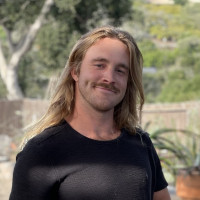
When Conner Smith decided to shift his life’s direction with graduate school, he was immediately drawn to the ocean. He was, after all, a longtime surfer and spearfisherman. “I wanted to tie my work to that, to give back to something I love,” he says. By the time he completed a master's at the Bren School of Environmental Science and Management at the University of California, Santa Barbara, last year, he’d learned that jobs in the public sector were hard to get — but knew, too, that the California Sea Grant State Fellowship could open doors.
His work for the Ocean Protection Council (OPC) — a Cabinet-level state body that works to maintain healthy oceans and ecosystems, headquartered in Sacramento — has focused on several priorities, from increasing support for tribal stewardship to advancing adaptive management of California’s Marine Protected Area Network. The work itself has included project management, community engagement and active research and visioning. “I’ve been treated as a real team member, despite only being here for a year,” he says. “And the Sea Grant brand has given me so much access to the community.” He’s pleased to see, too, that many former fellows now work at OPC, a place he’d be happy to stay. “It’s super great to see that it’s functioning as a pipeline,” he says.
DELTA STEWARDSHIP COUNCIL
Margot Mattson, Delta Science Program - Adaptive Management Unit
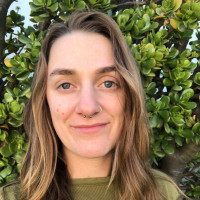
Margot Mattson’s thesis work at San Diego State University used satellite remote sensing to monitor wetland loss along the U.S.-Mexico border; as a Fulbright Fellow, she studied coastal wetlands near the mouth of the Rio Magdalena in Colombia. So her fellowship placement at the Delta Stewardship Council made plenty of sense: The Council was created to serve California’s largest swath of wetlands, the Sacramento-San Joaquin Delta, where the state has established coequal goals of providing reliable water and protecting ecosystems.
As part of the Adaptive Management Unit, Mattson helps scientists across agencies understand how the methods used to protect ecosystems need to evolve, whether due to the warming climate, invasive species or shifting human needs. One surprise has been that this work is not just physical science: Along with colleagues, Mattson has been analyzing interviews with tribal members and representatives about how they can work with government agencies to co-manage landscapes and resources. It’s this sort of surprise that drew her to the fellowship: Mattson wanted a chance to experiment, and see different possibilities opened by her degree. “I’m super grateful for this opportunity,” she says. “I’m learning new methods and getting to apply them directly to projects.”
Megan Nguyen, Delta Science Program - Research Funding Team
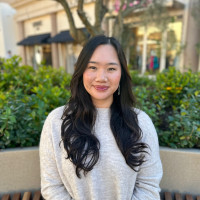
In retrospect, Megan Nguyen’s path into marine science is logical: She grew up visiting the beaches near her home in Orange County; she was an inquisitive kid, curious about nature and life; for generations, her ancestors had worked as fisher people. “But really I just kept following doors that opened for me,” Nguyen says. That led to a master’s at California State University, Fullerton, and a leadership role as the president of the Society for the Advancement of Chicanos and Native Americans in STEM — which reflected her interest in intersectionality in science.
As a Fellow, her work with the Research Funding Team has aligned with that interest: She’s focused on ensuring the research supported by the Delta Stewardship Council reflects the interests of everyone in the Delta. “And the best way to ensure that is considering where the funding goes,” Nguyen says. She is involved in every step of the research funding process, expanding the pool of applicants to include, among others, tribal researchers and community groups that are too often overlooked in academic funding. Her success in that role has led to a full-time position with the Delta Stewardship Council — “another door opened,” she says. Eventually, Nguyen wants to get back to teaching but knows she’ll carry this experience with her, able to tell students of diverse backgrounds that there are funders who are interested in their views. “I’ve loved getting to see not just how research gets done, but how research affects people,” she says. “That’s a niche I want to be in for the rest of my career.”
Alexandra Stella, Delta Science Program - Collaborative Science and Peer Review Unit
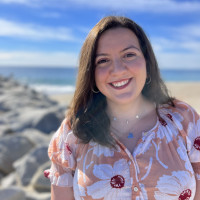
In 2023, as she completed a master’s degree in marine science at San Jose State University’s Moss Landing Marine Laboratories, Alexandra Stella felt that despite years of schooling she was not satisfied with her ability to communicate science effectively. “I was hoping to use this fellowship to refine my skills, to bridge the gap between science and decision-making,” she says. She was placed in a suitable role, then: the Collaborative Science and Peer Review Unit serves as a pipeline that links the many different stakeholder groups in the Delta to ensure that the state’s plans reflect their needs and views. The unit also convenes groups of experts who give feedback on state and federal monitoring that impact the region.
Stella eventually sought out a research project of her own design. One critical issue in the Delta is managing endangered and threatened species, and sometimes what one species needs can harm another. Stella is investigating how other entities have balanced such needs, seeking lessons to apply back home in the Delta. “This was my first full-time, 40-hour job,” she says. “I’ve learned a lot about collaboration, and about the process of getting new policies implemented in the world. This fellowship has been such a unique opportunity for me, after focusing on hard science, to learn about the application side of things.”
Jessica Weidenfeld, Delta Science Program - Communication and Synthesis Unit
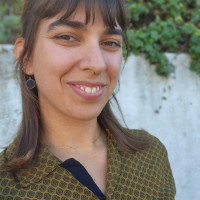
In her early 20s, while attending community college, Jessica Weidenfeld felt almost existentially lost. What is my purpose? she remembers wondering. What is the purpose of life? What gave her a firmer foundation — and a sense of hope — was realizing the possibilities that lie within studying science: “I know that you could be, like, a park ranger, but I didn’t realize that you could study wildlife and water and use science to improve the world,” Weidenfeld says. That eventually led to a master’s degree in ecology from San Diego State University. She found herself studying sea urchins — fun work, but still disconnected from improving the world. So, seeking experience in science policy, she pursued a California Sea Grant State Fellowship.
The fellowship has allowed Weidenfeld to hone a wide range of skills: the Science Communication and Synthesis unit submits a monthly report to the Delta Stewardship Council, summarizing hydrological data from the region; to replace a clunky, manual process, Weidenfeld is coding a piece of software to automate the process. She is also helping to manage the Bay-Delta Science Conference, including the art projects that will be displayed during the event. As a part of the fellowship, she’s also worked outside the Stewardship Council, facilitating meetings for California Sea Grant and Hawai’i Sea Grant focused on ensuring their grantmaking is equitable — “which has been useful in teaching me facilitation skills,” she says. Everyone involved with the program at Delta Stewardship Council has been “so kind, open and really caring — and have allowed me to have a choose-your-own-adventure that reflects my development plans.”
Dane Whicker, Planning and Performance Division
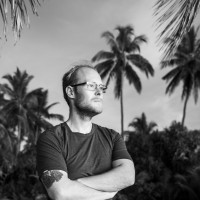
Though Dane Whicker grew up in Colorado, he’s been scuba diving since he was 12 years old. So when he was ready to wrap up a career as a pharmaceutical chemist and try something new, he decided to focus on the ocean. And not just ocean science: At the Scripps Institution of Oceanography, he began to dig into policy. “And I just absolutely adored it,” he says. Reading through court cases and legislation felt like a puzzle clicking into place: He saw all the complex steps needed to produce tangible results such as establishing marine protected areas. He admits that when he was placed with the Delta Stewardship Council, he was at first wary: This was far from the oceanic landscape he knew. “But I’ve learned that it’s this overlooked system of water that touches everything in California,” he says, “and it’s wrapped in its own tangle of policies.”
Much of Whicker’s work as a Fellow has been on making that system’s importance better known. A longtime podcaster, he’s developed a pilot episode for a program called “The Delta Dispatch”, a show that interviews both a science or policy expert and a member of the Delta community to discuss the links between important data collected by the Council and everyday life in the Delta. (He compares the style of the podcast to the chart-topper “Radiolab.”) He’s also helped lead a partnership event called Science for Communities. Working with Restore the Delta, Delta Stewardship Council and other tribal and academic partners, the project focused on increasing awareness of toxic harmful algal blooms to protect public health and increase collaborative data sharing. The work, he says, has not only underlined how complicated systems like the Delta can be, but also the importance of bringing people together to hear different points of view. “That's a skill that I'm going to take away and it's going to be useful anywhere,” he says.